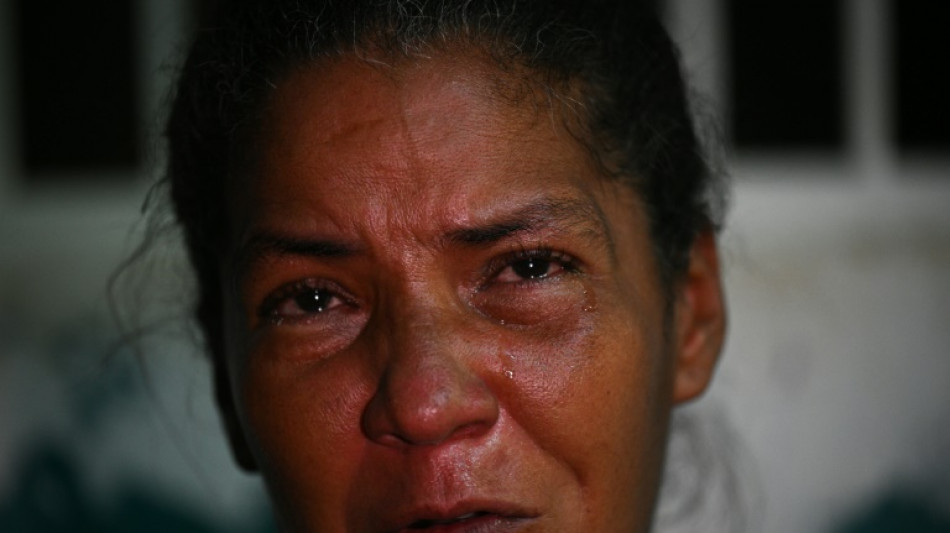
Venezuelan family feels full force of Trump's crackdown

Mercedes Yamarte's three sons fled Venezuela for a better life in the United States. Now one languishes in a Salvadoran jail, another "self-deported" to Mexico, and a third lives in hiding -- terrified US agents will crash the door at any moment.
At her zinc-roofed home in a poor Maracaibo neighborhood, 46-year-old Mercedes blinks back tears as she thinks about her family split asunder by US President Donald Trump's immigration crackdown.
"I wish I could go to sleep, wake up, and this never happened," she says, as rain drums down and lightning flashes overhead.
In their homeland, her boys were held back by decades of political and economic tumult that have already prompted an estimated eight million Venezuelans to emigrate.
But in leaving, all three brothers became ensnared by politics once more, and by a US president determined to bolt the door of a nation once proud of its migrant roots.
For years, her eldest son, 30-year-old Mervin had lived in America, providing for his wife and six-year-old daughter, working Texas construction sites and at a tortilla factory.
On March 13, he was arrested by US immigration agents and summarily deported to a Salvadoran mega jail, where he is still being held incommunicado.
The Trump administration linked Mervin and 251 other men to the Tren de Aragua -- a Venezuelan gang it classifies as a terrorist group.
Washington has cited tattoos as evidence of gang affiliation, something fiercely contested by experts, who say that, unlike other Latin American gangs, Tren de Aragua members do not commonly sport gang markings.
Mervin has tattoos of his mother and daughter's names, the phrase "strong like mom" in Spanish and the number "99" -- a reference to his soccer jersey not any gang affiliation, according to his family.
- The journey north -
Mervin arrived in the United States in 2023 with his 21-year-old brother Jonferson. Both hoped to work and to send some money back home.
They had slogged through the Darien Gap -- a forbidding chunk of jungle between Colombia and Panama that is one of the world's most dangerous migration routes.
They had trekked north through Mexico, and were followed a year later by sister Francis, aged 19, who turned around before reaching the United States and brother Juan, aged 28, who continued on.
When the brothers entered the United States, they registered with border officials and requested political asylum.
They were told they could remain legally until a judge decided their fate.
Then US voters voted, and with a change of administration, at dawn on March 13, US immigration agents pounded the door of an apartment in Irving, Texas where the trio were living with friends from back home.
Immigration agents were serving an arrest warrant when they saw Mervin and said: "You are coming with us too for an investigation," Juan recalled.
When the agents said they had an arrest warrant for Mervin too, he tried to show his asylum papers.
"But they already had him handcuffed to take him away," Juan said.
He was transferred to a detention center, where he managed to call Jonferson to say he was being deported somewhere. He did not know where.
Three days later, Jonferson saw his brother among scores of shorn and shackled men arriving at CECOT, a prison built by El Salvador's President Nayib Bukele to house alleged gang members.
Jonferson saw his handcuffed brother kneeling on the floor staring off into space. He broke down crying and called his mother.
She had also seen Mervin in the images. "My son was kneeling and looked up as if to say: 'Where am I and what have I done to end up here?'" said Mercedes.
"I have never seen my son look more terrified" she said.
- The journey south -
After his brother's arrest, Jonferson had nightmares. The fear became so great that he fled to Mexico -- what some euphemistically describe as "self-deportation".
There, he waited a month to board a Venezuelan humanitarian flight to return home.
"It has been a nightmare," he told AFP as he rode a bus to the airport and from there, onward home.
Juan, meanwhile, has decided to remain in the United States. He lives under the radar, working construction jobs and moving frequently to dodge arrest.
"I am always hiding. When I go to the grocery store I look all around, fearful, as if someone were chasing me," he told AFP asking that his face and his whereabouts remain undisclosed.
As the only brother who can now send money home, he is determined not to go back to Venezuela empty-handed. He also has a wife and seven-year-old son depending on him.
But he is tormented by the thought of his brother Mervin being held in El Salvador and by the toll it has taken on the family.
"My mother is a wreck. There are days she cannot sleep," Juan said.
"My sister-in-law cries every day. She is suffering."
- The journey home -
Jonferson has since returned to Maracaibo, where he was greeted by strings of blue, yellow, and red balloons and a grateful but still forlorn mother.
"I would like to be happy, as I should. But my other son is in El Salvador, in what conditions I do not know," Mercedes said.
But her face lights up for a second as she hugs her son, holding him tight as if never wanting to let him go.
"I never thought the absence of my sons would hit me so hard," she said. "I never knew I could feel such pain."
For now, the brothers are only together in a screen grab she has on her phone, taken during a video call last Christmas.
F.Lim--TNT